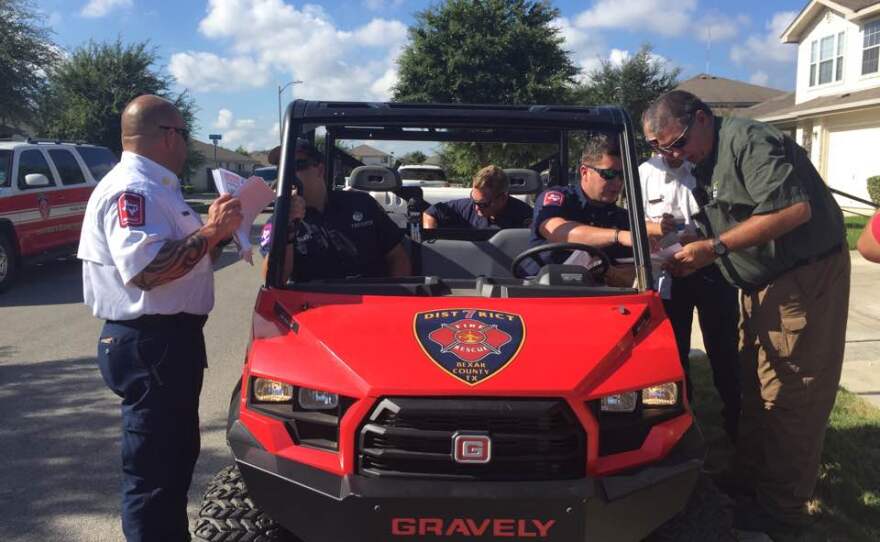Bexar County increased its number of mosquito traps back in April due to Zika concerns. This week, the state health department found West Nile in a mosquito or group of mosquitoes caught in one of the 27 traps placed in the areas it serves outside San Antonio's city limits.
“We immediately jumped out here, aggressively treated the area with foggers," said Bexar County spokeswoman Monica Ramos. "We treated all standing water with larvicide. We continue to carefully monitor the area, and today what we’re doing is going door to door alerting all the neighbors.”
Public health officials have long known that West Nile exists in the local mosquito population, but the County says a positive sample among those it has tested weekly is reminder to watch out for the range of mosquito-borne illnesses its technicians are testing for.
On Thursday, a few dozen first responders from different agencies met on a suburban street south of Helotes. Army Veteran Frank Dickey is part of the Community Emergency Response Team and rang doorbells to remind people to wear mosquito repellant and get rid of standing water.
“I can tell that people really appreciate getting the information,” said Dickey, tucking a pamphlet behind a door handle.
Some residents said they were surprised by the county’s response.
“I’m kind of caught off guard seeing fire trucks and stuff,” said Sarah McBridge. “It kind of seems like overkill for mosquitoes, but I’m glad they’re at least notifying us to something possibly going on.”
West Nile is a mosquito-borne virus that can cause flu-like symptoms. In rarer cases, it can cause neurological damage or even death. There are currently no human cases in Bexar County, but there were 3 cases last year and 12 cases--and at least one death--back in 2012.
On Thursday, Bexar County Public Works showed off its insecticide spraying trucks, which officials say the department drove through much of the public area in unincorporated Bexar County at least once this summer.
“We did go ahead and bring the fogger out here once we got that positive hit just to make sure we took care of anything,” said Public Works director Renee Green. “We’ll continue on with the cycle and try and treat all of the county.”
Scientists who survey mosquitoes around San Antonio say positive tests pop up most every year.
“We’ve known for years now that West Nile Virus is in San Antonio in some of the mosquito pools, but this is the first one they’ve identified so far this year,” said San Antonio Metropolitan Health District Interim Director Dr. Vincent Nathan.
Vincent says San Antonio Metro Health has concerns about the efficacy of spraying and prefers to rely more heavily on abatement methods including larvacides, which kill emerging mosquito larvae before they hatch. He notes the millions of bees killed amid aerial spraying for Zika in South Carolina earlier this month.
“We can’t kill all the mosquitoes in town anyway,” says Nathan. “From a practical standpoint, we just don’t think spraying is the most effective way. And we certainly don’t think it’s the first method of choice.”
The type of mosquito that typically carries West Nile virus is active at dawn and dusk, unlike the species that carries the Zika virus which is more active during the day.







